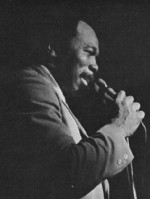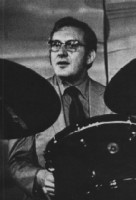
Thad Jones and Mel Lewis
A word from the oldest member
Cliff Weather

Our happy band
Happier than ever
Cliff Weather
Earl Gardner
There are four or five of us, I think, who have been with Thad and Mel since the band’s inception. But somehow, the timbre of the band never seems to change. Even though we’ve replaced a lot of men, we have great men all the time. The key factor almost always is Thad’s writing. Well, Bobby Brookmeyer wrote some charts, too; they play the same charts in the same way. It may also be due to the fact that we don’t get an influx of more than one or two men at one time; so they’re taken along with the mainstream as they come in.
Yes, you can safely say I’m the oldest member of the band—way oldest. I’m seventy. I have a hard time feeling that way, but when I look at the calendar I have to admit it. I started professionally back when I was eighteen or twenty—that’s a lot of years. I’ve had such a variegated career.
You know, it’s a funny thing, though—I really don’t consider that the old days were the best days. It seems to me that these are the good old days. Oh, I remember humorous things that happened to me when I was younger, and sometimes a bunch of the guys get around and want to know something about ‘35 or ‘45, the different bands, and different situations you’ve been confronted with. But I certainly don’t regret getting old—because it hasn’t hit me yet.
I’m still healthy, and physically my playing power hasn’t diminished—that’s for sure. As a matter of fact, I have to work less hard now to keep in shape.
When I was younger I was noted for being a high trombone player, and there’s a lot of pressure on you when you’re playing first chair all the time. I played first trombone on the Lucky Strike Hit Parade radio and TV show for twenty–five years. But I’ve found, with the bass trombone, since you’re in the low register most of the time, that there isn’t that worry and tension of high playing.
There is the tension of the fact that it’s sort of become a glamour instrument lately; they feature bass trombone quite a bit—in its own scope, not so much a solo part. It plays a very important part in the band.While I was playing all these high solos, I thought to myself: “Boy, wouldn’t these sound great down an octave?” I’d been on CBS staff for fifteen years, when the Garry Moore Show came in, and they needed a fourth trombone. But we didn’t have one an the staff. And the contractor said to me: “Do you think you’d like to play bass trombone?” I said: “I’d love to.” So I bought one, and that’s how it happened; I’ve been so happy with it ever since. Made more money, too! The change–over was good for me—particularly with this band. It isn’t as if you’re playing in a symphony, or a staff orchestra, where you have certain things that you know are difficult, and if you miss them it isn’t good. Because every note you play under those conditions is an audition almost. But now, everything is cool.You can clam the hell out of anything, and all it is is a big joke. Thad knows that nobody feels worse about a mistake than the man who made it; so he never leans on anybody, and nor does Mel. We just kid each other about it—really it isn’t that important. You can’t play fifteen to twenty thousand notes every night, and have them all right.Originally, all I did was straight work—with the Firestone Orchestra, the Wallenstein, Howard Barlow, Andre Kostelanetz, Percy Faith. I was playing first trombone on all those big–selling Columbia records by Andre Kostelanetz. Kostelanetz is a demanding conductor—if you don’t play well.
But if you play well, he’s the easiest guy in the world to get along with. I don’t mean only as far as your capabilities are concerned, but your attention, and your desire to play well. That’s all he wants, for a band to be businesslike—not to kid around, tune up, or to freeload, as we call it.
Everybody’s there tn make a buck, and we don’t have any illusions about setting the world on fire, as far as new–type jazz or anything. Although Kosty did inaugurate a really new type of music, with his concert arrangements of Gershwin, Richard Rodgers and so forth.But he’s an exceptional man, as regards recording. I remember he was one of the first men to use a single microphone at the other end of the studio, with only one mike up in the orchestra for close–up purposes—and usually that was only used for things like cup mutes or a sub–tone clarinet. It was his contention that the band should balance itself. His favourite saying was: “If you can’t hear the soloist, you’re playing too loud.” And that band actually played very softly—that’s why the engineers had so much control over it. It gave me a very keen sense of dynamics.I think a band playing softly is a beautiful thing. Unfortunately people don’t want to listen to it—they’d rather keep quiet themselves. But we do it in this band a great deal. Thad is a fabulous director.And he knows every nuance of every arrangement in the book. As does Mel—he’s very remarkable that way, as a drummer, too. In fact, he’s one of the few drummers I know like that—he knows all the brass figures, everything. It’s really remarkable. I was amazed, the first time I played with him—the first drummer I ever knew do that. He’s very musical.Once there were marked divisions between jazz players and straight players. Not any more—be-cause the jazz players have learned enough to respect the straight ones, and the straight men have heard jazz players perform in a way that they can’t. Or maybe could, but they don’t. So there’s a deep mutual respect. I have deep respect for symphony men. Of course, my problem is: in symphonic circles I’m known as a jazzman; in jazz circles I’m known as a long–hair! Another very good jazz band I worked with was Vic Schoen, who had the Patti Page show. But almost any good radio or TV orchestra is turned into a jazz band by the charts that come through. If they’re with the Supremes or Peggy Lee, or anybody with great charts, those orchestras can play that way, too. The idea is to be pliable, and be able to accept all different kinds of music.